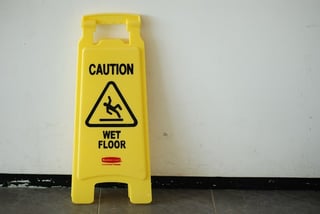Maintain your concrete floors to keep your employees safe
 We know that workplace safety is your priority, and no employer wants to see their workers injured on the job. However, when you work in an industrial-style setting—such as a warehouse, manufacturing plant or even commercial kitchen—you may find that you have unique safety challenges related to your concrete flooring.
We know that workplace safety is your priority, and no employer wants to see their workers injured on the job. However, when you work in an industrial-style setting—such as a warehouse, manufacturing plant or even commercial kitchen—you may find that you have unique safety challenges related to your concrete flooring.
One way you can protect your employees from slip-and-fall accidents as well as a number of other health hazards is to make sure your facility’s floors are properly maintained. Below are common flooring-related hazards to be aware of, plus tips for how to prevent them:
Slick or wet floors can cause falls
According to InsuranceJournal.com, slips and falls in the workplace cost U.S. businesses more than 16 billion dollars in 2012. Having slick or wet floors dramatically increases the chances of workplace accidents. Lesser-known trip hazards include worn tiles or floors with uneven texture (for example, switching from tile to concrete).
Solutions
- Make sure to mop up spills right away.
- Even out the surfaces of your floor by having your concrete polished, which can actually improve traction in areas of heavy traffic. (Note, though, that it’s not recommended for environments with high levels of dust or powder debris.)
- Consider having a specialty non-slip floor coating installed if your floors are particularly slick.
Unfilled concrete joints can cause fatigue
Because concrete by nature settles as it cures, a concrete floor will have cracks in it—either naturally forming cracks or planned joints (lines cut into the concrete surface to encourage cracking along predictable paths.)
However, these joints and cracks do create an uneven surface, which is another potential tripping hazard. In addition, if your employees operate ride-on machinery, the uneven surface caused by driving over joints will jostle the rider (not to mention wear out your machinery). Over time this can increase worker fatigue, plus possibly aggravate back conditions.
Solution
- Once your concrete has had sufficient time to cure, consider having joints and cracks professionally filled.
Contaminated or damp floors can cause respiratory issues
Your floors can also affect the air quality of your workplace. If your concrete is particularly damp, moisture collecting under equipment or furniture can encourage the growth of mold. Mold spores pose a host of health risks for employees, including triggering asthma, eye irritations and respiratory infections.
Keep in mind that untreated concrete is a porous substance, and so spilled liquids can seep into the floor where they can’t be mopped up. Concrete that’s been compromised this way can breed bacteria that may also cause respiratory problems or spread disease, plus contaminate your final product.
Solutions
- Perform a moisture test to determine whether you just need better climate control or a moisture-resistant floor coating.
- If you process food or beverages, have a USDA-approved floor coating installed to prevent microbial growth.
- If your facility handles hazardous chemicals on a regular basis, consider having a chemical-resistant floor coating installed.
While it’s not possible to prevent every workplace accident, fixing problems with your flooring will go a long way in protecting employees from injuries. If you’re not sure what the best solutions are for improving your floor conditions, contact the experts at CPC Floor Coatings. We’ve been working with concrete floors for more than 40 years, and we’d be happy to assess your floors and recommend solutions that will keep you and your workers safe.

